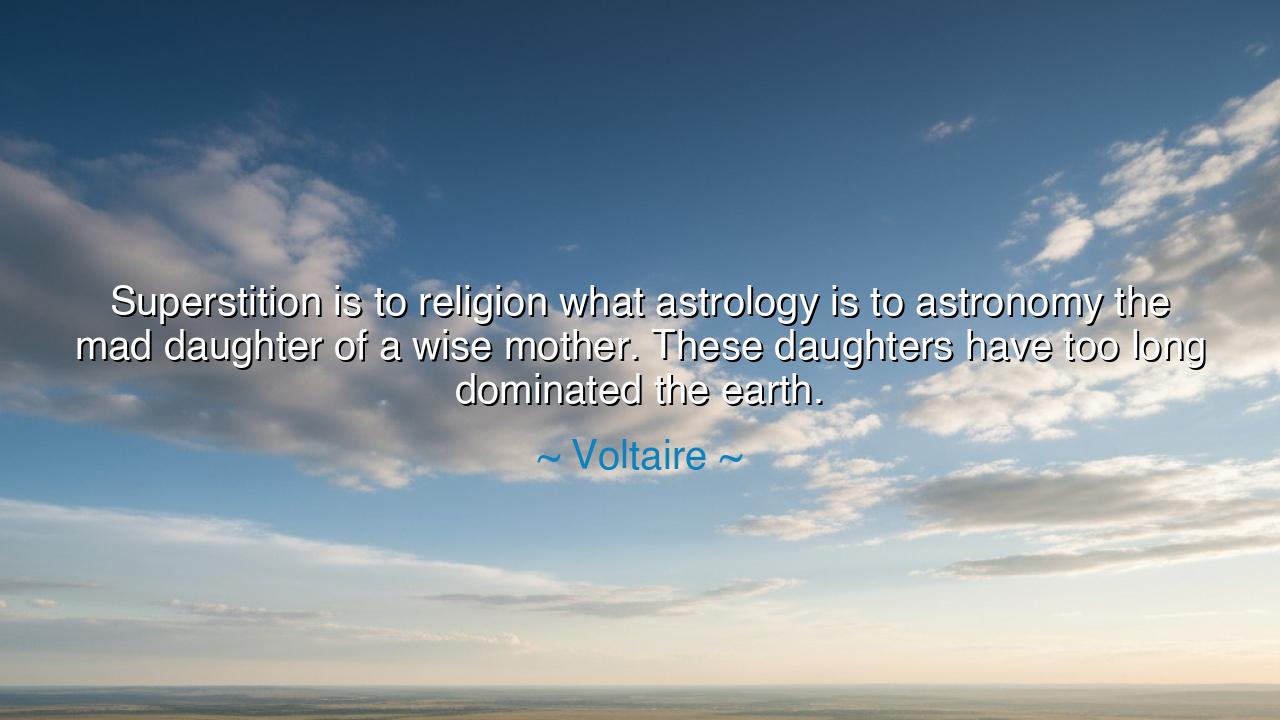
Superstition is to religion what astrology is to astronomy the
Superstition is to religion what astrology is to astronomy the mad daughter of a wise mother. These daughters have too long dominated the earth.






“Superstition is to religion what astrology is to astronomy—the mad daughter of a wise mother. These daughters have too long dominated the earth.” Thus spoke Voltaire, the fiery voice of the Enlightenment, who wielded his pen as others wield swords. In this striking metaphor, he reveals both reverence and rebellion—reverence for the wisdom of true faith, and rebellion against the madness of superstition that distorts it. The mother, he says, is wise: religion and astronomy both arise from the noble quest for understanding—the search for divine order, the yearning to know the heavens and the soul alike. But from these noble roots have sprung daughters of confusion, born of ignorance and fear: superstition and astrology, which trade reason for illusion, truth for comfort, and faith for control.
Voltaire’s words were born in a time when the world trembled between two ages—the dying twilight of medieval dogma and the dawning light of reason. Europe had endured centuries of bloodshed waged in the name of faith, where men who professed love of God burned their brothers for heresy. To Voltaire, this was the triumph not of religion, but of superstition—the mad daughter who had overthrown her mother and ruled the earth through fear. Religion, when pure, he saw as a guide to virtue, humility, and compassion; superstition, however, he condemned as the corruption of that faith, driven not by reverence but by terror, by the belief that one might bribe or appease heaven through ritual rather than righteousness.
To understand his meaning, one must look deeper into his metaphor. As astronomy is the science of the stars—measured, tested, and guided by reason—so astrology is its distortion, claiming to read fate in the patterns of the sky, binding men to illusions of destiny. In the same way, religion, rightly understood, seeks truth in the divine, and order in the moral law; superstition, its wayward child, seeks control through charms, idols, and fear. Where religion asks for the humility of faith, superstition offers the arrogance of certainty. Where religion frees the spirit, superstition enslaves it. Voltaire’s lament is not for the death of belief, but for its madness, which, cloaked in holiness, had too long ruled over reason and humanity alike.
Consider the story of Galileo Galilei, the astronomer who dared to say that the earth moves around the sun. His telescope, a humble instrument of truth, became an object of heresy in the eyes of superstition. The wise mother—religion—teaches that the universe is the work of divine order, that truth cannot contradict the Creator. Yet the mad daughter—superstition—struck him down, declaring that to know the heavens was to defy heaven itself. Galileo, imprisoned for his discoveries, stood as a symbol of Voltaire’s warning: that when superstition reigns, light itself is forbidden to shine.
But this madness is not confined to the past. Even now, superstition whispers in new forms—in blind fanaticism, in conspiracy disguised as faith, in hatred wrapped in holy words. The wise mother’s voice is quiet, urging reflection, mercy, and humility; but her daughters still cry louder, promising certainty where there is mystery, promising control where there should be trust. Voltaire’s wisdom calls us to distinguish the sacred from the superstitious—to honor faith by freeing it from fear, to seek truth not in the trembling of omens but in the stillness of understanding.
And yet, Voltaire’s words are not a call to destroy religion, as some have claimed, but to purify it. He believed that true religion—stripped of superstition—was the light of moral truth, the harmony between man and the divine. His fight was not against God, but against those who spoke falsely in God’s name. For just as the stars still shine regardless of what astrologers proclaim, the divine still endures beyond the madness of those who twist it. The task of the wise, he teaches, is to separate the eternal from the imagined, to seek the wisdom of the mother and reject the frenzy of the daughter.
So, my child of thought and spirit, take this lesson to heart: let your faith be guided by reason, and your reason be softened by faith. Do not worship fear or ignorance, for they disguise themselves as holiness. Question what you are told, but do not lose reverence for what is true. When you encounter those who wield superstition to divide or dominate, remember Voltaire’s warning—the daughters of wisdom may go mad when their mother is forgotten. Bring them home again through compassion, knowledge, and truth.
For the earth has indeed been ruled too long by the daughters of madness—by superstition and fanaticism, by the pride of those who claim to know what they do not understand. The time has come, as Voltaire dreamed, for the return of the wise mother—for religion that enlightens rather than enslaves, for knowledge that humbles rather than corrupts. Then, and only then, shall the human spirit walk in harmony beneath the stars—no longer ruled by shadows, but guided by the radiant light of understanding and the quiet wisdom of the divine.






AAdministratorAdministrator
Welcome, honored guests. Please leave a comment, we will respond soon